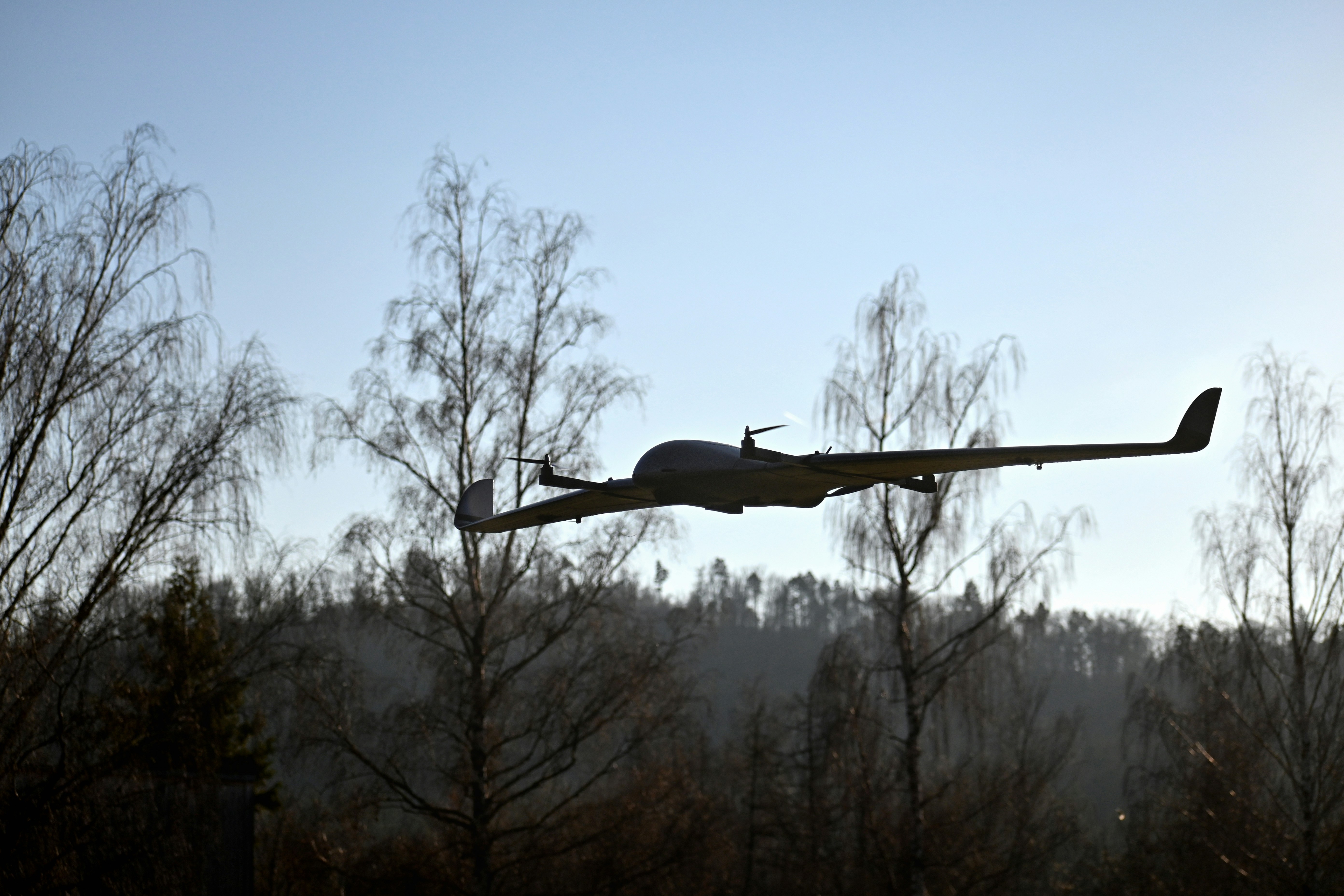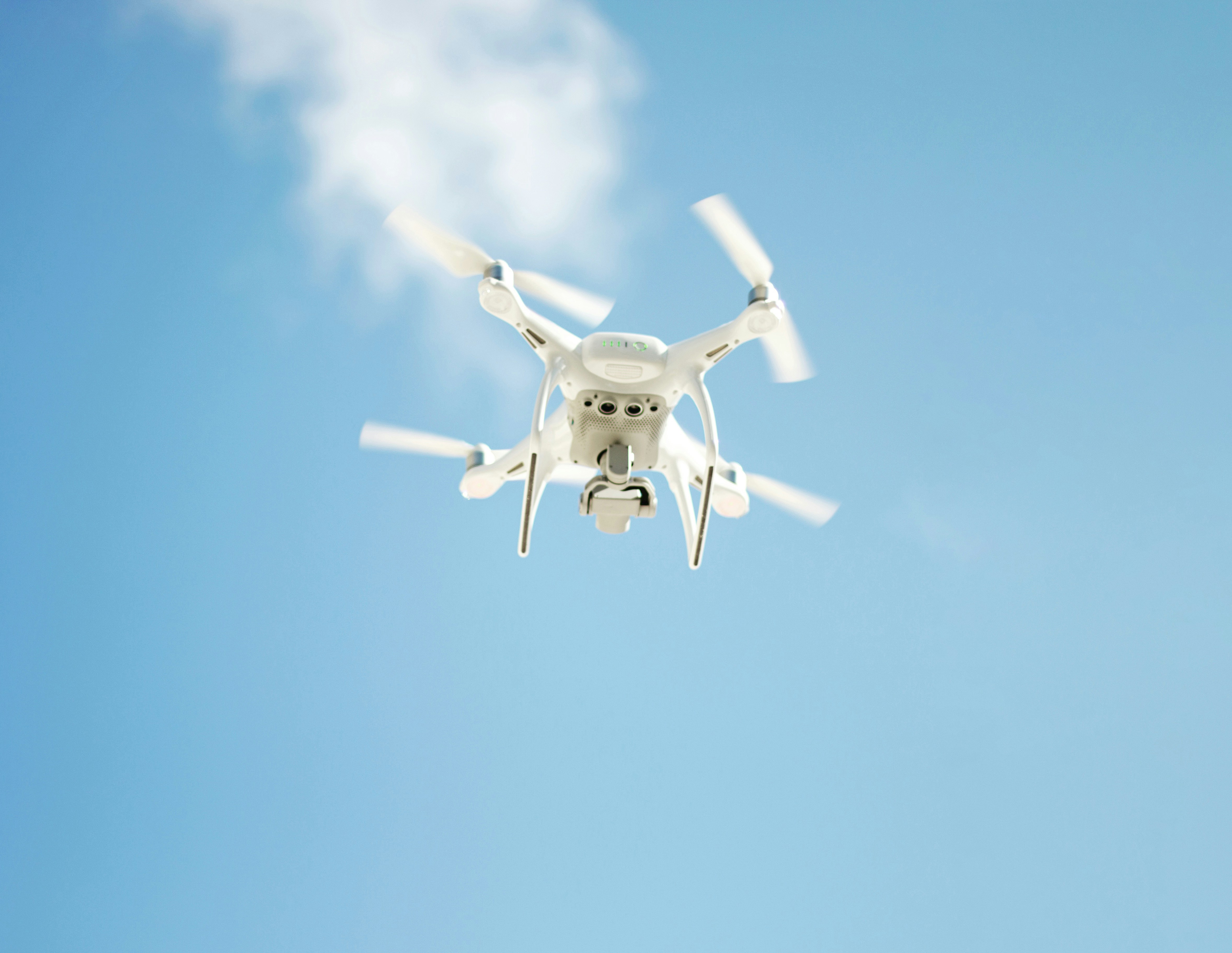
Why Now Is the Perfect Time to Launch Your Career in UAVs: The UK's Aerial Revolution
The United Kingdom stands at the forefront of an unmanned aerial vehicle revolution that's fundamentally transforming how we approach logistics, surveillance, agriculture, infrastructure inspection, and emergency response. From the advanced drone technologies developed by British companies powering delivery networks across Europe to the autonomous flight systems enabling Beyond Visual Line of Sight operations, the UK's leadership in UAV design, manufacturing, and operations has created an unprecedented demand for skilled drone professionals that dramatically exceeds the current talent supply.
If you've been seeking a career at the cutting edge of aviation technology or looking to position yourself in one of the most rapidly expanding and strategically important sectors of the modern economy, unmanned aerial vehicles represent an extraordinary opportunity. The convergence of autonomous flight system advancement, commercial drone adoption acceleration, regulatory framework maturation, and artificial intelligence integration has created perfect conditions for UAV career success.
The UK UAV Boom: A £2.4 Billion Aerial Powerhouse
Britain's UAV sector has evolved from military applications and hobbyist drones to sophisticated commercial platforms that power everything from last-mile delivery to precision agriculture. The industry now contributes over £2.4 billion annually to the UK economy, with growth rates consistently exceeding 35% year-on-year—making it one of the most strategically important and rapidly expanding technology sectors globally. More importantly for career seekers, UAV employment has grown by 420% since 2020, creating opportunities that combine advanced aerospace engineering with cutting-edge autonomous systems.
The Midlands has established itself as the UK's drone valley, home to major UAV manufacturers and a constellation of drone technology companies, autonomous systems startups, and research institutions that collectively represent Europe's most concentrated ecosystem of unmanned aviation expertise. The region's unique position combining world-class aerospace heritage with commercial UAV innovation has created an environment that attracts global investment and the world's most talented drone engineers.
The opportunity extends across the entire UK geography. Scotland's beyond visual line of sight testing corridors, Wales' drone delivery trials, Northern Ireland's aerospace UAV integration, Cornwall's maritime drone operations, and London's drone traffic management ecosystem demonstrate that UAV opportunities exist wherever advanced flight systems, autonomous technology, and aerial applications intersect.
Salary levels reflect both the highly specialised nature of UAV engineering and the global competition for drone expertise. UAV systems engineers now command average salaries between £45,000-£85,000, with senior flight systems architects and autonomous navigation specialists earning £75,000-£130,000+. Even entry-level UAV positions typically start at £28,000-£45,000, with some of the most lucrative career progression available in any aviation field.
Why the Perfect Storm Has Arrived
1. The Commercial Drone Market Explosion and Regulatory Maturation
The Civil Aviation Authority's progressive approach to drone regulation, including the establishment of Beyond Visual Line of Sight corridors and the integration of drones into controlled airspace, has positioned the UK as Europe's most advanced UAV operating environment. The CAA's Innovation Sandbox and regulatory flexibility have attracted international drone companies to establish UK operations whilst creating unprecedented opportunities for drone professionals who understand both technical capabilities and regulatory compliance.
This regulatory leadership creates exceptional opportunities for UAV professionals who can navigate complex airspace integration whilst building commercially viable drone operations. From flight operations management to regulatory compliance, the maturation of drone regulation creates career opportunities across the entire UAV value chain.
The establishment of drone testing corridors in Scotland, urban air mobility trials in cities, and integration with Air Traffic Control systems demonstrate the UK's commitment to building comprehensive UAV capabilities that require thousands of skilled professionals.
2. The Autonomous Flight Systems and AI Integration Revolution
The explosive growth of artificial intelligence applications in autonomous navigation has created insatiable demand for sophisticated flight control systems, computer vision algorithms, and machine learning-enabled drone operations. UK companies including Blue Bear Systems Research, Airbus Defence and Space, and numerous AI-powered drone startups are developing autonomous systems that can navigate complex environments without human intervention.
This autonomous drone boom requires UAV professionals who understand both traditional aerospace engineering and cutting-edge AI technologies including sensor fusion, path planning algorithms, and real-time decision making. The intersection of AI and unmanned aviation represents one of the highest-growth and highest-compensation areas in aerospace technology.
Advanced autonomous applications in urban air mobility, search and rescue operations, infrastructure inspection, and agricultural monitoring create sustained demand for UAV professionals who can bridge AI algorithm requirements with practical flight system implementation.
3. The Commercial Applications Transformation Across Industries
The adoption of drones across industries from construction to healthcare has created massive demand for application-specific UAV systems, specialized sensors, and industry-compliant operations. From thermal imaging drones for building inspections to medical delivery drones for rural healthcare, specialized applications require UAV professionals who understand both drone technology and specific industry requirements.
UK industries and their supply chains require UAV professionals who understand both traditional aerospace engineering and the specialized requirements of commercial applications including safety standards, environmental conditions, and regulatory compliance specific to each sector.
The drone service sector, encompassing everything from aerial surveying to emergency response, represents Europe's fastest-growing UAV market segment, creating unique career opportunities in operational flying, data analysis, and specialized drone services.
UAVs Across Every Industry Sector
Unmanned aerial vehicles have evolved from military and recreational applications to enabling critical operations across all industries. This ubiquity has created diverse career opportunities spanning all sectors that benefit from aerial perspectives and autonomous operations:
Logistics and Delivery: From package delivery to medical supply transport, the UK's logistics companies are integrating drones for last-mile delivery and emergency supply operations. Royal Mail trials, Amazon Prime Air development, and medical drone deliveries create opportunities for UAV professionals who understand both flight operations and supply chain integration.
Agriculture and Environmental Monitoring: Precision agriculture, crop monitoring, and environmental surveillance require UAV professionals who combine drone expertise with agricultural knowledge and environmental sensing capabilities. The integration of multispectral sensors, crop analysis algorithms, and autonomous field operations creates specialized career paths.
Construction and Infrastructure: Building inspections, surveying, and construction monitoring using drones require specialists who understand both UAV operations and construction industry requirements. Bridge inspections, power line monitoring, and construction progress tracking create opportunities for professionals with combined drone and infrastructure expertise.
Emergency Services and Public Safety: Search and rescue operations, disaster response, and law enforcement applications require UAV professionals who understand both flight operations and emergency response protocols. Fire service drone units, police surveillance operations, and maritime rescue services create specialized career opportunities.
Energy and Utilities: Wind turbine inspections, solar panel monitoring, and power line surveillance require UAV professionals who combine drone expertise with energy industry knowledge and safety-critical system understanding. The offshore wind industry particularly creates unique opportunities for maritime UAV operations.
Media and Entertainment: Aerial photography, film production, and live event coverage require creative professionals who understand both artistic requirements and technical flight operations. The integration of professional cinematography with advanced flight systems creates specialized career paths.
The Diverse UAV Career Landscape
Unmanned aerial vehicles encompass multiple specialisations and career paths. The field's technical diversity has created opportunities for professionals with varied engineering backgrounds and specialisation interests:
UAV Design Engineers who create aircraft configurations and system architectures remain in highest demand. These roles require deep understanding of aerodynamics, flight mechanics, and system integration including autopilot systems, sensor integration, and communication systems.
Flight Systems Engineers who develop autopilot software and autonomous navigation capabilities are essential for creating next-generation drone capabilities. These positions require understanding of control systems, sensor fusion, and autonomous navigation algorithms.
Payload Integration Specialists who integrate cameras, sensors, and specialized equipment are crucial for application-specific drone development. These roles require expertise in sensor systems, data acquisition, and application-specific requirements.
UAV Operations Specialists who plan and conduct drone missions are essential for commercial drone services. These positions require understanding of flight planning, regulatory compliance, and operational safety management.
Remote Pilot/UAV Operators who fly drones for commercial applications are increasingly important for service delivery across industries. These roles require pilot certification, operational expertise, and application-specific knowledge.
UAV Data Analysts who process and interpret drone-collected data are crucial for extracting value from aerial operations. These positions require understanding of photogrammetry, GIS systems, and application-specific analysis techniques.
Real Pathways Into UAVs
For Aerospace Engineers and Aviation Professionals
If you have experience in aerospace engineering or aviation operations, transitioning to UAVs builds naturally on your flight systems knowledge and regulatory understanding. Focus on learning unmanned systems technologies, autonomous flight control, and commercial drone applications.
Start by exploring UAV applications within your current aerospace expertise, whether that's flight control systems, aircraft design, or aviation operations. Your aerospace background provides excellent foundation for understanding advanced flight systems and airspace integration.
Many successful UAV professionals began by working on manned aircraft systems, gaining drone-specific knowledge whilst leveraging existing aeronautical engineering skills.
For Electrical Engineers and Electronics Professionals
Your understanding of electronic systems, sensors, and communication technologies translates perfectly to UAV avionics and payload integration roles. Focus on learning flight control systems, sensor integration, and drone-specific electronic systems.
Electronics engineering experience is particularly valuable for UAV roles involving autopilot development, sensor fusion, and communication system integration. Your circuit design and systems integration skills are essential for modern drone development.
Consider specializing in areas that bridge electronics and flight systems, such as autopilot hardware development, sensor integration, or ground control system design.
For Software Engineers and Computer Science Professionals
Your programming skills and algorithm development experience translate excellently to autonomous flight software and drone data processing roles. Focus on learning flight control algorithms, computer vision, and real-time embedded systems programming.
Software engineering background is particularly valuable for UAV roles involving autonomous navigation, mission planning software, and data analysis systems. Your programming expertise is crucial for developing intelligent drone behaviours.
Consider roles that combine your software skills with aerospace applications, such as autopilot software development, computer vision for navigation, or drone fleet management systems.
For Mechanical Engineers and Manufacturing Professionals
Your understanding of mechanical systems, materials, and manufacturing processes translates well to UAV structural design and manufacturing roles. Focus on learning aircraft design principles, composite materials, and drone-specific manufacturing techniques.
Manufacturing experience provides valuable perspective for UAV roles that must integrate advanced capabilities with practical manufacturing constraints and cost considerations. Your design and production optimization skills are particularly relevant for scalable drone manufacturing.
Consider specializing in UAV structural design, propulsion systems, or manufacturing processes that require both mechanical engineering and aviation expertise.
For Geospatial and Surveying Professionals
Your understanding of mapping, surveying, and spatial analysis translates perfectly to drone surveying and photogrammetry roles. Focus on learning aerial photography techniques, photogrammetric processing, and UAV-specific surveying applications.
Surveying background is particularly valuable for UAV roles involving precision mapping, construction monitoring, and geographic information systems integration. Your spatial analysis skills are essential for extracting maximum value from drone-collected data.
Consider roles that combine your geospatial expertise with drone operations, such as aerial surveying, mapping services, or GIS data collection and analysis.
For Career Changers and New Graduates
UAVs actively welcome motivated professionals with strong technical aptitude and genuine interest in the technology that's revolutionizing how we approach aerial operations. The field's interdisciplinary nature means that diverse technical backgrounds can find relevant applications in drone technology.
Start with foundational courses in aeronautics, electronics, or relevant specializations depending on your interests. University programmes and industry training courses offer comprehensive UAV education designed for newcomers from various technical backgrounds.
Build practical experience through flight training, technical projects, or entry-level positions that provide hands-on exposure to drone systems and operations. Many UAV companies offer graduate training programmes designed to develop comprehensive drone expertise.
Education and Training Ecosystem
The UK offers world-class UAV education opportunities, with leading universities, training centres, and industry programmes providing multiple pathways into the field.
Universities including Cranfield University, University of Liverpool, Coventry University, and University of Glasgow offer leading aerospace and UAV-focused programmes. These academic programmes provide theoretical foundations whilst incorporating practical experience with state-of-the-art drone systems and flight operations.
Training organizations including the National College for High Speed Rail, drone training academies, and commercial pilot schools provide comprehensive UAV pilot training and technical education. These programmes often combine theoretical knowledge with extensive hands-on flight experience.
Industry training programmes from major UAV companies and service providers offer specialized education in specific systems, applications, and operational procedures. These programmes typically combine technical training with practical operational experience.
Professional certification bodies including the Civil Aviation Authority provide standardized UAV pilot licensing and operational approvals. The CAA's Permission for Commercial Operation (PfCO) and other certifications provide recognized credentials for professional drone operations.
The Financial Reality
UAV careers offer strong financial rewards that reflect both the specialized expertise required and the strategic importance of drone technology. The rapid growth of commercial drone applications drives compensation consistently above average engineering and technology sector levels.
Entry-level UAV positions typically start between £22,000-£38,000, with rapid progression based on certification development and operational experience. Experienced UAV professionals can expect salaries between £45,000-£85,000, whilst senior specialists, operations managers, and UAV technology leaders often command packages exceeding £100,000.
Specialization premiums are significant in UAVs. Professionals with expertise in cutting-edge areas like Beyond Visual Line of Sight operations, autonomous systems, specialized applications, or specific certifications typically earn 25-35% more than generalist UAV professionals. Leadership roles combining technical expertise with operational management can reach £120,000+ total compensation.
Consulting opportunities are increasingly lucrative for experienced UAV professionals, with daily rates typically ranging from £400-£900 for specialists with proven operational experience or specific technical expertise. The project-based nature of many drone applications makes consulting attractive for professionals with established track records.
Entrepreneurial opportunities are exceptional in UAVs, with relatively low barriers to starting drone service companies combined with rapidly expanding market demand across industries.
Geographic Distribution and Remote Opportunities
UAV opportunities in the UK are distributed across regions with aerospace heritage, testing facilities, and commercial demand, though the operational nature of much UAV work requires field presence.
The Midlands aerospace corridor represents the UK's largest concentration of UAV manufacturing and development expertise, from major aerospace companies to specialized drone manufacturers. This region offers opportunities spanning from aircraft design to autonomous systems development.
Scotland's beyond visual line of sight testing corridors and rural applications create exceptional opportunities in advanced operations and regulatory development. The region's specialization in remote operations creates unique career opportunities.
London and the South East offer opportunities in UAV services, regulatory affairs, and technology development. The region's combination of technology expertise and commercial demand creates distinct UAV career paths.
Wales and Northern Ireland's aerospace heritage combined with drone trial programmes create opportunities that blend traditional aerospace with cutting-edge UAV applications.
The nature of UAV work varies in remote work suitability. Software development and data analysis roles are well-suited to remote arrangements, whilst flight operations, maintenance, and hands-on development typically require field presence. Many UAV careers offer hybrid arrangements combining remote technical work with operational flying time.
Innovation and Entrepreneurship
UAVs offer exceptional opportunities for entrepreneurial professionals. The combination of advancing technology capabilities, diverse application markets, and relatively accessible entry requirements creates numerous opportunities for drone service companies, specialized applications, and technology development ventures.
The UK's supportive regulatory environment and strong aerospace ecosystem provide excellent foundation for UAV technology transfer and startup companies. Innovation centres and aerospace incubators actively support entrepreneurs in commercialising drone innovations.
Many successful UAV professionals combine employment with consulting, service provision, or entrepreneurial activities, using their technical expertise and operational knowledge to develop innovative solutions or provide specialized drone services.
Professional Community and Continuous Learning
The UK UAV community is vibrant and rapidly growing, with strong connections between industry, operators, and technology developers supporting continuous innovation and knowledge sharing.
Regular conferences including Commercial UAV Expo Europe, UAV Tech World, and aerospace-specific symposiums offer opportunities to learn about breakthrough developments and connect with UAV innovation leaders. Operational workshops and technical conferences provide continuous learning and networking possibilities.
Professional organisations including the Association for Unmanned Vehicle Systems International (AUVSI), Royal Aeronautical Society, and UAV industry associations provide networking opportunities, technical resources, and career development support.
Online communities including UAV forums, drone operator groups, and professional networks facilitate knowledge sharing and collaboration. The UAV community's culture of innovation and practical application makes it accessible for newcomers seeking expertise and mentorship.
The rapid evolution of drone technologies, regulations, and applications means that continuous learning is essential for UAV professionals. This creates a culture of adaptability, innovation, and continuous skill development that many professionals find intellectually stimulating and professionally rewarding.
Looking Forward: The Next Decade
The UAV sector's strategic importance ensures continued growth and revolutionary developments throughout the 2020s and beyond. Urban air mobility, drone swarms, artificial intelligence integration, and advanced autonomous operations will create entirely new categories of UAV careers and applications.
The integration of drones with artificial intelligence, Internet of Things, space systems, and advanced materials will create hybrid roles that combine traditional aerospace expertise with cutting-edge technology knowledge. These positions represent the future intersection of unmanned aviation with transformative technologies.
Sustainability and environmental applications are increasingly important in UAV development, creating demand for professionals who understand both flight operations and environmental monitoring, conservation, and climate science applications.
Making Your Transition
Successfully entering the UAV industry requires combining technical knowledge with practical operational experience and specific certification requirements. The field's operational focus and regulatory complexity emphasise both comprehensive preparation and hands-on flight experience.
Start by identifying your natural entry point based on existing skills and interests. Aerospace engineers might focus on systems design, whilst software engineers might emphasise autonomous systems or data analysis applications.
Build practical experience through pilot training, technical projects, or entry-level positions that provide hands-on exposure to drone operations and systems. Many successful UAV careers begin with pilot certification combined with technical specialization.
Obtain relevant certifications and qualifications for your chosen specialization. Focus on certifications aligned with your career goals, whether that's commercial pilot licenses, technical certifications, or specialized operational approvals.
Create a portfolio of projects and experience that demonstrate your capabilities and understanding of UAV systems and applications. Focus on projects that show both technical competence and practical operational understanding.
Set realistic expectations for career transition timelines. Most successful UAV career transitions require 6-12 months of focused learning and certification, depending on starting background and target specialization. The key is consistent skill development combined with practical operational experience.
Conclusion: Your UAV Future Takes Flight Now
The convergence of regulatory maturation, commercial adoption acceleration, autonomous systems advancement, and cross-industry application expansion has created an unprecedented opportunity for UAV career entry. The UK's position as Europe's leading UAV operating environment and technology developer ensures that professionals entering the field now will benefit from continued growth, regulatory leadership, and exceptional opportunities building the aerial systems that power the autonomous future.
UAVs represent more than extraordinary career opportunity—it's the chance to work on the cutting-edge technology that's revolutionizing how we approach logistics, monitoring, inspection, and emergency response. From life-saving search and rescue operations to precision agriculture that feeds the world, from infrastructure monitoring that keeps our cities running to environmental research that protects our planet—every UAV innovation has the potential to make the world safer, more efficient, and more connected.
The professionals who establish themselves in UAVs now will be positioned to lead the aerial revolution that transforms industries, creates new business models, and enables capabilities that were impossible with traditional aviation. They will build careers characterised by technological innovation, practical impact, and the satisfaction of creating systems that extend human capabilities into the sky.
Your UAV career journey begins with recognising that drones are not just flying cameras—they're sophisticated autonomous systems that represent the future of aerial operations, the enabler of precision agriculture, the guardian of critical infrastructure, and the lifeline for emergency response operations.
In UAVs, you're not just flying drones—you're pioneering the aerial systems that enable precision farming, save lives in emergencies, monitor our changing environment, and create the autonomous sky that will transform how humanity interacts with the three-dimensional world.
Ready to launch your career in the skies of tomorrow? Discover how your technical skills and passion for cutting-edge aviation technology can contribute to the UK's UAV revolution. The future flies on autonomous wings—make sure you're the one programming their flight path.
Looking to launch your UAV career in the UK? Explore the latest opportunities and connect with leading employers at UAV Jobs UK. From graduate drone technician positions to senior autonomous systems architect roles, find your perfect UAV career match today.


